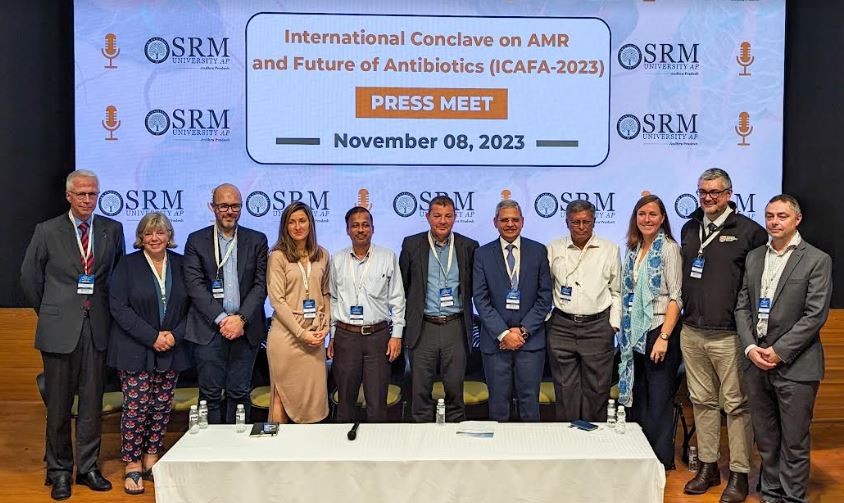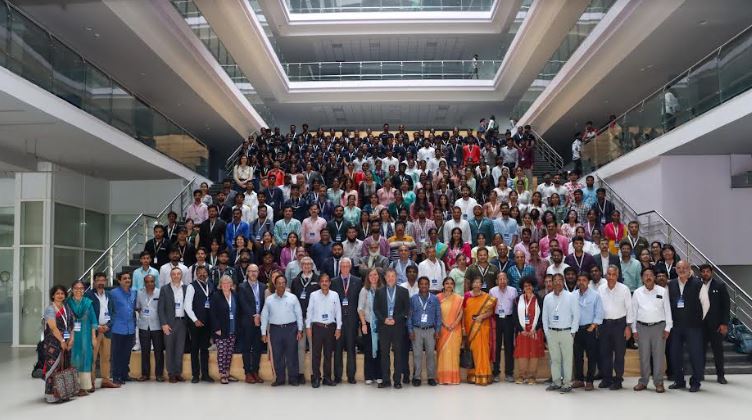Press Release
ICAFA 2023 at SRM University-AP Pioneering the Fight Against Antimicrobial Resistance

[ad_1]
SRM University-AP successfully conducted a two-day International Conclave on Antimicrobial Resistance (ICAFA 2023) in collaboration with AMR Insights from The Netherlands, UK Innovate KTN, Global AMR Hub, Germany, Nitte (Deemed to be University), FABA and ICFAI where esteemed speakers and renowned researchers from across the world came together to address the critical issue of antimicrobial resistance and promote global health awareness.
 |
Renowned speakers from across the globe attended the Press Conference organised during ICAFA-2023 at SRM University-AP
ICAFA 2023 acted as a premier platform for experts to share insights, exchange knowledge, and collectively develop actionable strategies to combat the pressing issue. The conclave proved to be a significant milestone in the field of healthcare by providing a common ground for multidisciplinary experts to engage in thought-provoking discussions like ways to make people aware of the right use of antibiotics and control measures to combat it. The event witnessed the presence of leading healthcare professionals, researchers, policymakers, and scientists like Dr Marteen Van Dongen, AMR Insights, Netherlands; Dr Simon Doherty, Queen’s University Belfast, UK; Dr Joanna Wiecek, CSO, CircaGene, UK; Dr Mandy Nevel, Head of Animal Health and Welfare, AHDB, UK; Dr Peter Coombs, LifeArc, UK; Dr Robin Cohen, Innovate UK; Prof. Ranga Reddy Burri, IFCAI, Prof Reddanna, FABD, Prof. Niyas Ahmed, Shanti Swarup Bhatnagar Fellow from the University of Hyderabad, Dr. Nagendra R. Hegde, NIAB and many more who showcased their expertise and shared groundbreaking research and measures in combating AMR. Acknowledging the pressing need for international collaboration and research to combat antimicrobial resistance, SRM University-AP extended its reach through a strategic partnership by signing an MOU with AMR Insights and NITTE (deemed to be the University).
 |
Delegates and participants at the International Conclave on Antimicrobial Resistance organised by SRM University-AP
In addition to the esteemed keynote address, an interactive panel discussion and press conference were organized, covering various aspects of antimicrobial resistance. The conference served as a platform for experts to make people aware of the emergence of drug-resistant infections, challenges in the reckless use of antibiotics, and innovative approaches to infection control because of the adverse effects.
Besides the main conference event on Thursday, three roundtables with themes on One Health, Therapeutics and Vaccines, and Diagnostics and Therapeutics were held, during which UK experts, Indian AMR researchers, experts from industry and startups, and representatives from the state medical colleges, AP government departments – health, animal husbandry, and Fisheries, discussed on the possibilities of UK- India collaboration efforts to combat AMR pathogens.
Concluding the International Conclave on Antimicrobial Resistance, dignitaries from SRM University-AP and other esteemed institutions released “10 Mantras to Combat Antimicrobial Resistant Microorganisms” These guidelines encapsulate the collective wisdom and recommendations of the experts present at ICAFA 2023, serving as a guiding light for healthcare professionals, policymakers, and the public in combating antibiotic resistance.
Prof. Manoj K Arora, Vice Chancellor, SRM University-AP, emphasized the institution’s commitment to addressing global health challenges and fostering interdisciplinary collaborations. Antimicrobial resistance is a complex issue that requires collective action. By hosting ICAFA 2023, SRM University AP aims to create a platform for fruitful discussions, research collaborations, and policy recommendations to combat this global health crisis.
Prof. Jayaseelan Murugaiyan, Associate Dean i/c (Sciences) SEAS and Head of the Biological Sciences Department expressed his gratitude towards the participants and speakers for their contributions to this remarkable event. He stated, “ICAFA 2023 has provided us with a robust platform to collaborate, exchange ideas, and collectively address the challenges of antimicrobial resistance. We are confident that the knowledge shared, and the strategies proposed during this conclave will pave the way for a healthier future.”
SRM University-AP’s successful organization of ICAFA 2023 demonstrates its commitment to fostering collaborative efforts in addressing global health challenges. By bringing together international experts and promoting public awareness, the university reiterates its dedication to advancing healthcare and finding tangible solutions to combat antimicrobial resistance.
[ad_2]
Source link
Press Release
New Study Reveals Majority of Indians Prioritize Nutrition Over Taste, Surpassing Global Average

[ad_1]
Based on a recent survey of urban Indian consumers:
-
Nine out of 10 consumers are searching for protein-rich food compared to seven out of 10 global shoppers. -
The top four qualities consumers look for when buying snacks are (1) natural, (2) heart-healthy, (3) protein-rich and (4) energy-source, all of which come before satisfying cravings. -
Nuts have emerged as one of the most popular snacking choices, with 86% of Indian shoppers report having purchased them in a span of 6 months. -
Urban Indians read nutrition labels more than the global average, reflecting a growing trend towards informed purchasing. -
69% of urban dwellers surveyed have the opinion that plant-based protein is just as good as meat-based protein, exceeding the global average of 55%.
Wonderful Pistachios, the world’s largest grower and processor of pistachios and distributor of California Pistachios in India, released today, World Nutrition Day, the findings of a new global study that sheds light on the snacking habits of urban Indians. The study, commissioned with Material, a leading global research consultancy, included 10 countries and over 12,400 respondents, revealed a new behavioural trend that urban Indian consumers prioritize nutrition over taste when it comes to snacking. This growing preference for healthy snacking emphasizes the importance of good nutrition for overall well-being.
For the India market specifically, the study delved into the snacking habits of 2,415 shoppers across six Indian cities, which represented a population of approximately 35.9 million consumers. Remarkably, a majority of urban Indians (58%) reported basing their food purchasing decisions on nutritional benefits more than taste, exceeding the global average of 52%. Delhi and Ahmedabad lead with over 60% of urban shoppers preferring nutrition in their food. Bengaluru and Chennai follow closely, indicating a nationwide shift towards smarter snacking preferences. In India, Millennials and Gen Z are leading the charge in health-conscious purchasing decisions, with more than 83% of consumers in these age groups reading nutritional labels before buying.
Indian consumers prioritize four key factors when shopping for nutritional snacks: natural (free of artificial colours and preservatives), heart-healthy, protein-rich, and provides energy. Nine out of 10 urban shoppers consciously seek protein-rich food options, compared to the global average of seven out of 10. The focus on nutrition has fueled the rise of nuts as a preferred snack choice, becoming essential to daily eating habits. The study found a staggering consumption of nuts, with 86% of Indian shoppers report purchasing them in a span of 6 months, compared to just 75% globally. With 6g of protein in per 28g serving, California Pistachios are a smart snack choice that provides benefits without sacrificing taste.
Shail Pancholi, Country Director, India, Wonderful Pistachios, commented on the study, saying, “Nuts were traditionally used as garnishes and consumed during festivals, but have now become a popular snack in India, indicating a notable shift in dietary habits. Pistachio consumption in India has doubled in the last six years, as consumer awareness of the nutritional benefits that pistachios offer has grown. Consumers are discovering that pistachios are naturally cholesterol-free, rich in plant-based protein and dietary fiber, and provide over 30 different vitamins and minerals.”
Interestingly, the study found that nuts are the second most preferred snack among urban Indian consumers, with 64% of Baby Boomers and 59% of Gen Z prioritizing nutrition over taste when selecting food. This indicates a growing focus on health across generations, with Baby Boomers focusing on senior wellness and Gen Z reflecting the rise of mindful purchasing. Though on opposite ends of the age spectrum, these two generations take the lead in seeking protein-rich options, as well as preferring natural snacks.
Mumbai tops most of the consideration sets when choosing a snack. Residents opt for natural ingredients (35% vs. the national average of 30%), heart-healthy options (33% vs. 30%), and protein (33% vs. 29%). Chennai residents look for energy-boosting snacks (31% vs. the national average of 29%).
The fact that 69% of urban Indians surveyed have the opinion that that plant-based protein is just as good as meat-based protein reflects a positive shift towards varied dietary preferences. Pistachios are a good source of high-quality complete protein, containing all nine essential amino acids. A 28g serving of pistachios provides 6g of protein, which is 11% of the recommended daily allowance (RDA) according to FSSAI.
The Wonderful Pistachios study unveils a compelling shift in Indian snacking habits. Nuts are evolving from festive treats to a daily snacking staple, fueled by a nationwide preference for more nutritious options. The trend transcends generations, resonating with Gen Z and Baby Boomers alike, underscoring the growing importance of mindful eating in urban India. As consumers increasingly seek natural, heart-healthy, protein-rich, and energy-boosting snacks, the future of Indian snacking appears to be firmly rooted in nutrition and well-being.
Wonderful Pistachios
Wonderful® Pistachios is the world’s largest grower and processor of pistachios, with a global presence in over 70 countries. As a vertically integrated operation, they are experts in every step of the process from tree to shelf, ensuring the highest-quality product every time. In tandem with its Grower Partners, Wonderful Pistachios harvests 125,000 sunny acres (50,000 hectares) of land in California that receive warm days and cool nights, which work in harmony with the rich, natural soils to create the perfect growing climate for high-quality pistachios. They ship 600 million pounds (204 million kg) of nuts worldwide from their advanced processing facilities to ensure the highest standards are met. When it comes to pistachios, Wonderful® Pistachios expertise is unmatched in scale and capacity, paired with warehouses and sales teams worldwide that are well-equipped to provide support at every step of the way.
California Pistachios
California Pistachios are grown and distributed by The Wonderful Company, the world’s largest vertically integrated pistachio processor and marketer located in California’s Central Valley. California Pistachios are Non-GMO, providing a smart, healthy choice for consumers around the world. Sun-ripened in the moderate Mediterranean climate of California, these distinctively green nuts pack taste and contain antioxidants and over 30 different nutrients. California Pistachios in India are available under leading brands and private labels at retail outlets, grocery stores, and online platforms.
For more information about California Pistachios India, please visit www.b2b.wonderfulpistachios.com
[ad_2]
Source link
Press Release
Singapore Prepares Ahead to Leverage Artificial Intelligence for a Better Future

[ad_1]
SINGAPORE, May 31, 2024 /PRNewswire/ — Senior Minister of State for Communications and Information Tan Kiat How launched the Digital Enterprise Blueprint (DEB) at Asia Tech x Singapore (ATxSG) 2024 today. The Blueprint will enable SMEs to harness technology, optimise the way they work, and strengthen digital resilience and cybersecurity across the ecosystem. 50,000 SMEs are expected to benefit over the next five years through four key focus areas:
- Empower enterprises to be smarter by adopting AI-enabled solutions
- Enable enterprises to scale faster through cloud-based and integrated solutions
- Equip enterprises to be safer through improved cyber resilience
- Support enterprises to upskill workers to make full use of digital capabilities
Seven partners have come onboard to pledge their commitment, including Singapore Business Federation, Singapore Computer Society, SGTech, Amazon Web Services, Google, Microsoft and Salesforce.
In collaboration with IMDA and the TechSkills Accelerator for ITE and Polytechnics Alliance, SGTech is launching the Tech Apprenticeship Programme to expand the career pathways of graduates by providing access to industry apprenticeships that offer on-the-job training and development opportunities. Over the next two and a half years, SGTech aims to facilitate the placement of at least 300 apprentices who are fresh or mid-career professionals from polytechnic or ITE backgrounds, and drive the adoption of similar practices that promote more inclusive hiring and career agility.
IMDA and the Singapore Academy of Law (SAL) signed an MoU aimed at uplifting the legal sector’s productivity through the use of GenAI. As part of this partnership, GPT-Legal, a new large language model which is contextualised for Singapore’s legal sector, will be co-developed. The model will be integrated into SAL’s research platform LawNet, which is accessible by 75% of Singapore’s lawyers. SAL will also be penning an MoU with the National University of Singapore and AI Singapore to develop its AI capabilities and create a certification to recognise AI specialists in the legal profession.
Additionally, Tribe and Digital Industry Singapore announced a collaboration with NVIDIA to launch the Ignition AI Accelerator for AI startups to create and bring to market the next wave of advancement in AI solutions. This programme will nurture 15 high-potential startups, equipping them with well-rounded support covering business and technical needs. NVIDIA and Tribe will also collaborate with EnterpriseSG to offer qualified AI startups funding support through the Startup SG Tech scheme, and assist them through the IMDA Accreditation process.
Singapore hosted the final meeting of the UN Secretary-General’s Artificial Intelligence Advisory Body (AIAB) from 28-29 May. As part of the agenda, Singapore facilitated an engagement session between AIAB and the Digital Forum of Small States (Digital FOSS). Digital FOSS Fellows exchanged views with AIAB members on the topic of AI governance, particularly on the implications and challenges faced by small states. Through such efforts, Singapore aims to promote a more inclusive approach towards shaping global AI and digital governance.
Contact:
[email protected]
![]() View original content to download multimedia:https://www.prnewswire.com/in/news-releases/singapore-prepares-ahead-to-leverage-artificial-intelligence-for-a-better-future-302160193.html
View original content to download multimedia:https://www.prnewswire.com/in/news-releases/singapore-prepares-ahead-to-leverage-artificial-intelligence-for-a-better-future-302160193.html

[ad_2]
Source link
Press Release
One in Six Globally Concerned About Colorectal Cancer Screening Costs

[ad_1]
SHENZHEN, China, May 31, 2024 /PRNewswire/ — By 2040, the burden of colorectal cancer (CRC) is projected to increase to 3.2 million new cases and 1.6 million deaths per year representing a 66% and 71% rise in new cases and deaths respectively relative to 2020.

To better address the global burden of CRC and reduce its impact, BGI Genomics has launched the second edition of its global CRC awareness report, covering 1,938 respondents from Brazil (306), China (367), Poland (300), Saudi Arabia (300), Thailand (362), and Uruguay (303):
CRC Screening Gaps Vary Globally: Nearly half (49.3%) of global respondents have never undergone CRC screening, with the highest proportions in Saudi Arabia (62.0%) and Poland (61.0%).
Preference for Fecal Testing Over Colonoscopy: Although colonoscopies are more recognized (33.4%), fecal tests at healthcare facilities are preferred (31.8%), reflecting a trend towards non-invasive methods.
Cost and Fear are Determinants of Screening Choice: Fear of colonoscopy (18.2%) and screening costs (17.7%) are major barriers to CRC screening. Poland (24.7%) and Uruguay (21.0%) show the highest fear of colonoscopy, while Thailand (24.5%) and Brazil (20%) indicate the most concern about costs.
Medical Advice and Family History Drive CRC Screening: Doctor’s recommendations are a major driver for CRC screening (30.5% globally), with Uruguay showing the highest adherence (44.1%). Additionally, those with a family history of CRC are more proactive in screening (64.5%), compared to the general population (35.0%).
Prof. Varut Lohsiriwat from Mahidol University offers his insights to this report. He suggested: “The essence of effective cancer screening lies in the acceptance and adherence of the patient to the screening method. The best screening method is the one that the patient accepts and adheres to because that’s the method that will actually benefit them.”
Dr. Zhu Shida, BGI Genomics Deputy GM, notes: “At BGI Genomics, we focused our efforts on developing advanced molecular biology testing techniques to close the gap [between acceptance and accessibility]. The ultimate goal is to transform colorectal cancer from a life-threatening disease into a manageable condition through widespread, early screening and intervention.”
For more region-level comparisons, access the full BGI Genomics 2024 State of CRC Awareness Report.
All data involved in this report come from the results of an online survey project conducted by BGI Genomics. It only surveys awareness related to colorectal cancer and does not involve personally identifiable data.
Logo – https://mma.prnewswire.com/media/1608027/BGI_Logo.jpg
![]() View original content:https://www.prnewswire.co.uk/news-releases/one-in-six-globally-concerned-about-colorectal-cancer-screening-costs-302159170.html
View original content:https://www.prnewswire.co.uk/news-releases/one-in-six-globally-concerned-about-colorectal-cancer-screening-costs-302159170.html

[ad_2]
Source link

 Fashion8 years ago
Fashion8 years agoThese ’90s fashion trends are making a comeback in 2017

 Entertainment8 years ago
Entertainment8 years agoThe final 6 ‘Game of Thrones’ episodes might feel like a full season

 Fashion8 years ago
Fashion8 years agoAccording to Dior Couture, this taboo fashion accessory is back

 Entertainment8 years ago
Entertainment8 years agoThe old and New Edition cast comes together to perform

 Sports8 years ago
Sports8 years agoPhillies’ Aaron Altherr makes mind-boggling barehanded play

 Press Release8 years ago
Press Release8 years agoUber and Lyft are finally available in all of New York State

 Sports8 years ago
Sports8 years agoSteph Curry finally got the contract he deserves from the Warriors

 Entertainment8 years ago
Entertainment8 years agoDisney’s live-action Aladdin finally finds its stars





